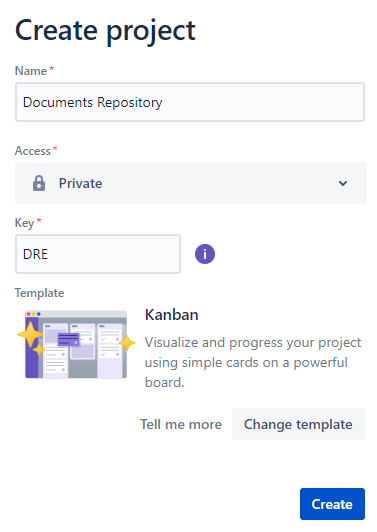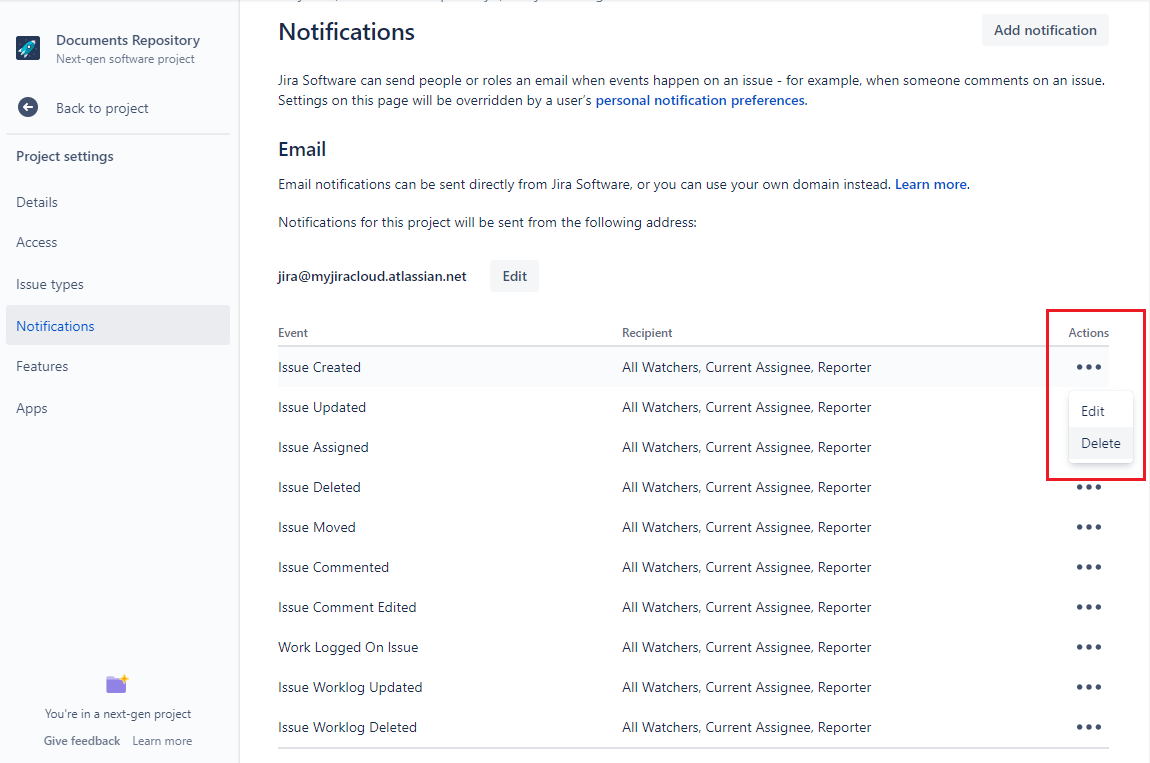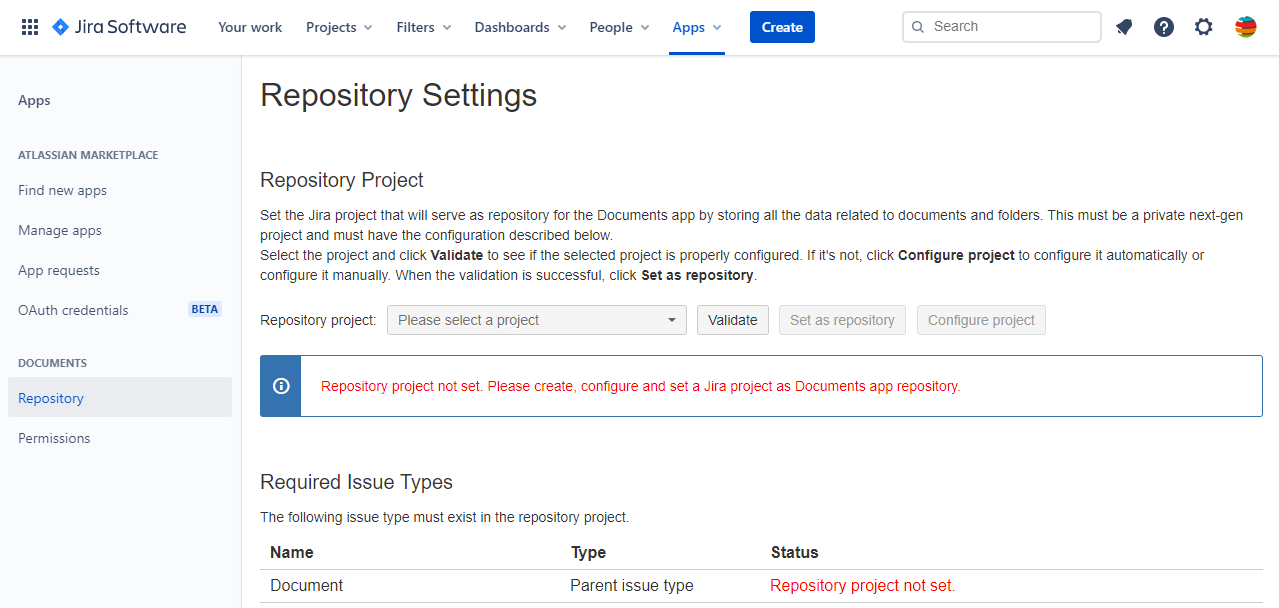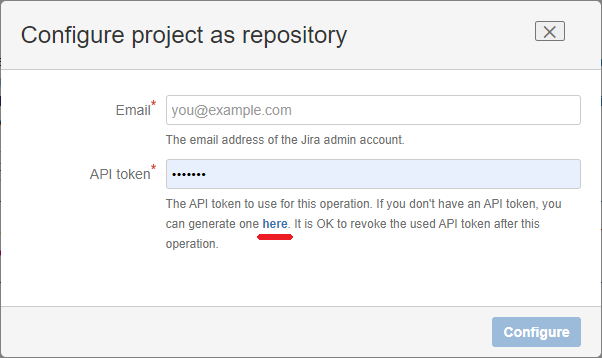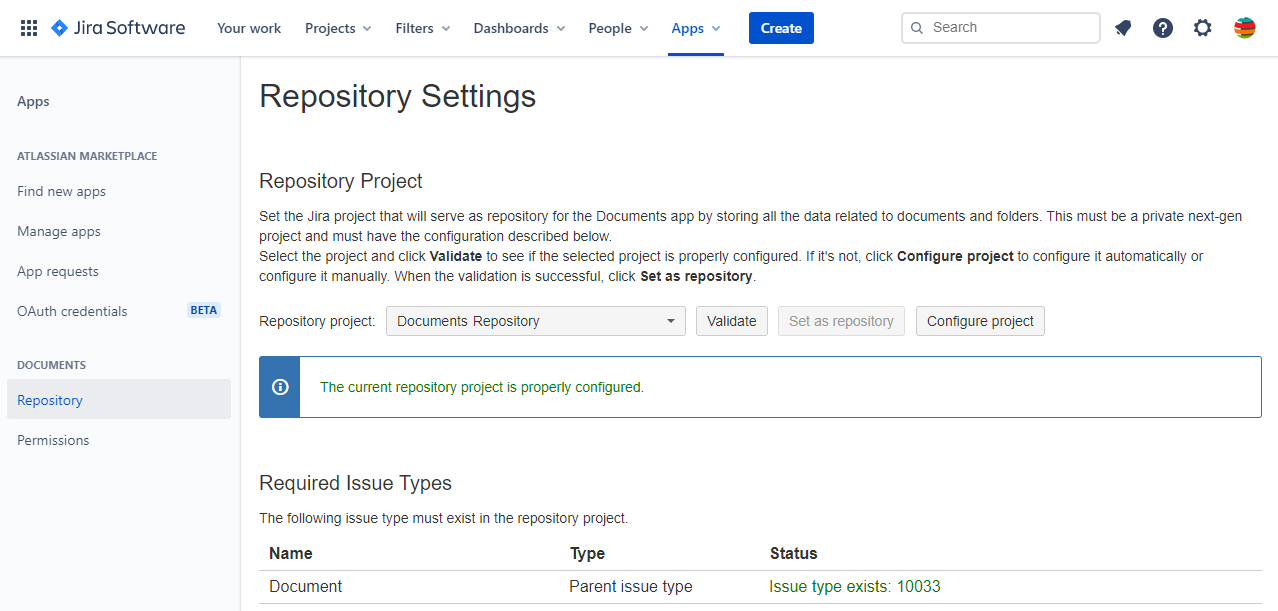On this page
Configuring the app repository
The app requires a dedicated Jira team-managed private project to serve as data repository. The repository is the place where all the documents added via the app, including files and metadata, will be stored. Right after the app installation you have to create and configure a Jira team-managed private project that will serve as the app repository. For more details about the app repository, see the File & metadata storage section below.
Follow these steps to create and configure the app repository project:
Log into your Jira instance as an admin.
Create a new private team-managed project that will be used as the app repository:
Go to Projects>Create project.
At Project templates select Software development and choose the Kanban template
NOTE: If you are on Jira Service Management, you might not have the option to create team-managed projects. Go to https://<YOUR_SITE_NAME>.atlassian.net/jsd-next-gen and switch Enable team-managed projects to ON. Then click the Create a team-managed project button to begin the project creation.
At Choose a project type step, click Select a team-managed project
In "Create project" screen enter a suggestive project name, select Private access and keep the default Kanban template.
NOTE: If you are on Jira Service Management, you might not have the Kanban template. If so, select the Quick Start template from the Work Management templates category.
Click Create. The project is created.
Disable the notifications on the new project:
Go to Project settings > Notifications.
Delete all the notification events from the table.
Navigate to Apps > DOCUMENTS > Repository. The current displayed status indicates that the repository is not yet configured.
The repository project must have a specific configuration in terms of issue types and custom fields in order to be used as the app repository. This can be done automatically; just follow these steps.
At Repository project select the Jira team-managed project that you created before.
Click Configure project to start configuring the selected project automatically.
You will be prompted to provide your email address and an API token. This is required by the app to automatically configure the project. Click the "here" link and generate an API token.
Copy the generated token and paste it in the API token field.
After entering the email and API token, click Configure.
The automatic process of configuring the selected project will start. You can revoke the API token once this step is completed; it is no longer required.
If it is successful, click Set as repository. The repository project configuration is now fully completed!
In case of any error, please contact support@stonikbyte.com for assistance.
At this stage, the repository is configured and the users can start using the app. To test, open a Jira project, click on its Documents tab and create a new folder or File.
VERY IMPORTANT!
Do not modify the issue-types or the fields configuration of this project because this impacts the app's functionality.
Do not manually create, delete or modify the issues of this project because this can cause invalid app repository data.
Ensure that the regular users do not have access to the repository project.
Do not delete this project. Deleting the project will cause the lost of the entire Documents data from your Jira Cloud instance.
Configuring the app permissions
You can restrict the access to the "Documents" tab or restrict specific privileges (create, edit, delete, move) regarding documents or folders through the app permissions configuration. Follow these steps to configure the app permissions:
Log into your Jira instance as an admin.
Navigate to Apps > DOCUMENTS > Permissions.
On the Permissions tab, check the actions that you want to allow for each project role. The list includes the project roles from both company-managed and team-managed projects. See the table below for a complete description of the available permissions.
Click Save to apply the changes.
The table below shows details about the available permissions.
Permission | Description |
|---|---|
View | Check this option if you want the project role members to view and download the documents posted on the “Document” tab. The users who do not have this permission will get a permission error message when trying to access the Documents tab. |
Create | Check this option if you want the project role members to be able to add documents and folders. The “Add Document” button will be hidden for the users who do not have this permission. |
Edit | Check this option if you want the project role members to be able to edit documents and folders or to restore previous versions of the documents. The “Edit” option will be hidden for the users who do not have this permission. |
Delete | Check this option if you want the project role members to be able to delete documents and folders. The “Delete” option will be hidden for the users who do not have this permission. |
Move | Check this option if you want the project role members to be able to move documents and folders to another folder. The “Move” option will be hidden for the users who do not have this permission. |
Unlock | Check this option if you want the project role members to be able to unlock editing for specific documents and folders. The “Unlock” option will be hidden for the users who do not have this permission, but it is always offered to the user who locked the document regardless of this setting. |
NOTE: If a Jira user is member of a project role that has a specific permission but is also member of another project role that does not have that permission, it is considered that the user in question has that permission.
NOTE: The Project Lead has full permissions and can perform all the actions on project's documents.
